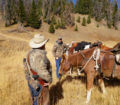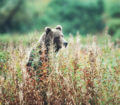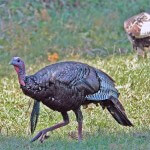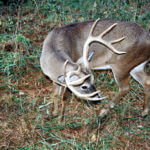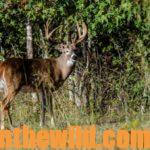Editor’s Note: Karl Badger from Salt Lake City, Utah, captures the essence of what elk hunting is all about and hunts elk all over the West. In some western states, mule deer and elk seasons start about August 15 for bowhunting and usually continue until the end of September. Firearms season continue to the end of November or the first of December.
 As I’ve mentioned earlier this week, I live in Salt Lake City, Utah, near a major mountain range called the Wasatch Range that runs north to south in northern Utah. The hunting in these mountains is a lot of fun. I particularly like to hunt mule deer close to home. I’ll either do an all-day or a one-night hunt in these mountains, because they’re not more than 15 or 20 minutes from my home.
As I’ve mentioned earlier this week, I live in Salt Lake City, Utah, near a major mountain range called the Wasatch Range that runs north to south in northern Utah. The hunting in these mountains is a lot of fun. I particularly like to hunt mule deer close to home. I’ll either do an all-day or a one-night hunt in these mountains, because they’re not more than 15 or 20 minutes from my home.
I can hunt elk and mule deer there from August 15 through December 15 with my bow. A couple years ago I got a Bowtech Prodigy bow (http://bowtecharchery.com/), which I’ve enjoyed shooting. I went to a trail head with some pretty steep terrain that went up into an area called City Creek – one of the water resources for Salt Lake City. I was hunting a day or two before Thanksgiving. Most of the leaves had fallen off the trees, and not much bugling was happening. I had gotten into quite a good herd of elk the night before, and I saw several bulls that I thought were in the 290- to 350-inch range. The problem I had was that the bulls were out in an open meadow, and I didn’t have much cover to slip up on them without being seen. I had to crawl on my hands and knees, and then I had to get down on my belly and belly crawl. Although I didn’t bag one of those nice bulls, I couldn’t believe that I could see that size elk so close to my home and near a major city like Salt Lake. I thought to myself, “When I can put an elk in my bowsights, look over my shoulder and off in the distance see a major city like Salt Lake, I’ve got a good place to hunt.” Although I haven’t taken an elk in those mountains, I have had an opportunity to take quite a few mule deer.
What’s fun about hunting in the Wasatch Mountains is during the summer months we go hiking, backpacking and camping there and always see numbers of deer on these summer trips. When the rut starts in the mountains, the deer seem to pop up out of the ground and fall out of the trees, there are so many of them. Usually, when I go bowhunting, I plan to carry enough gear to spend the night in the woods that first day. Then I hunt back toward the trail head the next morning.
 On one particular hunt in the Wasatch Mountains, I spotted two nice mule deer bucks with their horns locked-up, pushing on each other. We’d had a little snow the day before. These two bucks were so interested in proving who was the strongest that I was able to sneak through some oak brush. I was hoping that they would quit pushing, shoving and jumping in-between the does watching the fight, so I’d be able to get a shot. Finally, one of the bucks was at 40 yards, and I was able to slip an arrow behind his front shoulder. I was surprised when that buck started running up the mountain. Normally, when a mule deer is hit by an arrow, he runs down a mountain. But after the buck only had gone about 50 yards, he piled up. He wasn’t that big and probably only would have scored 100-120 on Pope & Young. But I thoroughly enjoyed my hunt and taking that mule deer with my bow near my home.
On one particular hunt in the Wasatch Mountains, I spotted two nice mule deer bucks with their horns locked-up, pushing on each other. We’d had a little snow the day before. These two bucks were so interested in proving who was the strongest that I was able to sneak through some oak brush. I was hoping that they would quit pushing, shoving and jumping in-between the does watching the fight, so I’d be able to get a shot. Finally, one of the bucks was at 40 yards, and I was able to slip an arrow behind his front shoulder. I was surprised when that buck started running up the mountain. Normally, when a mule deer is hit by an arrow, he runs down a mountain. But after the buck only had gone about 50 yards, he piled up. He wasn’t that big and probably only would have scored 100-120 on Pope & Young. But I thoroughly enjoyed my hunt and taking that mule deer with my bow near my home.
 Unfortunately, when I go on those 1- to 2-day deer hunts, I don’t take my horses or my mules with me. I was by myself on this hunt. So, I boned-out my buck and started carrying him out. I carried the first load of meat out by myself. Then I called a couple of my buddies, and they came and helped me carry the rest of the meat out. Many times my friends will be hunting in the mountains the same day I am. Since we all have cell phones, I usually can learn where my buddies are hunting, and the friend closest to me will come help me carry my meat out. Of course, I return the favor when I’m in the mountains, and one of my friends takes a mule deer or an elk.
Unfortunately, when I go on those 1- to 2-day deer hunts, I don’t take my horses or my mules with me. I was by myself on this hunt. So, I boned-out my buck and started carrying him out. I carried the first load of meat out by myself. Then I called a couple of my buddies, and they came and helped me carry the rest of the meat out. Many times my friends will be hunting in the mountains the same day I am. Since we all have cell phones, I usually can learn where my buddies are hunting, and the friend closest to me will come help me carry my meat out. Of course, I return the favor when I’m in the mountains, and one of my friends takes a mule deer or an elk.
To get John and Denise Phillips’ free cookbook, “Miz Denise’s Outdoor Cooking: More than 35 Recipes for Elk and Mule Deer,” go to https://johninthewild.com/free-books. You also can learn about John’s other available elk books at https://johninthewild.com/books.

